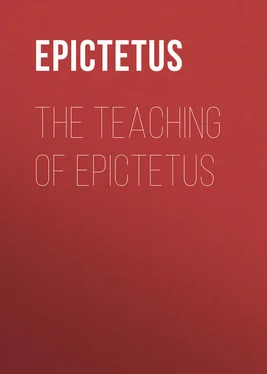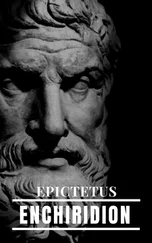Epictetus - The Teaching of Epictetus
Здесь есть возможность читать онлайн «Epictetus - The Teaching of Epictetus» — ознакомительный отрывок электронной книги совершенно бесплатно, а после прочтения отрывка купить полную версию. В некоторых случаях можно слушать аудио, скачать через торрент в формате fb2 и присутствует краткое содержание. Жанр: Философия, foreign_antique, foreign_prose, на английском языке. Описание произведения, (предисловие) а так же отзывы посетителей доступны на портале библиотеки ЛибКат.
- Название:The Teaching of Epictetus
- Автор:
- Жанр:
- Год:неизвестен
- ISBN:нет данных
- Рейтинг книги:5 / 5. Голосов: 1
-
Избранное:Добавить в избранное
- Отзывы:
-
Ваша оценка:
- 100
- 1
- 2
- 3
- 4
- 5
The Teaching of Epictetus: краткое содержание, описание и аннотация
Предлагаем к чтению аннотацию, описание, краткое содержание или предисловие (зависит от того, что написал сам автор книги «The Teaching of Epictetus»). Если вы не нашли необходимую информацию о книге — напишите в комментариях, мы постараемся отыскать её.
The Teaching of Epictetus — читать онлайн ознакомительный отрывок
Ниже представлен текст книги, разбитый по страницам. Система сохранения места последней прочитанной страницы, позволяет с удобством читать онлайн бесплатно книгу «The Teaching of Epictetus», без необходимости каждый раз заново искать на чём Вы остановились. Поставьте закладку, и сможете в любой момент перейти на страницу, на которой закончили чтение.
Интервал:
Закладка:
Epictetus
The Teaching of Epictetus / Being the 'Encheiridion of Epictetus,' with Selections from the 'Dissertations' and 'Fragments'
INTRODUCTION
But for the zeal and ability of one disciple we should not now possess any trustworthy account of the teaching of Epictetus. For, like not a few other sages, he wrote nothing – his teaching was purely oral, delivered, in the form of lectures or discourses, to the students who came to him to receive their education in philosophy. One of these students was Flavius Arrianus, afterwards Senator and Consul of Rome, named by Lucian “one among the first of Roman men,” and known to us chiefly as author of the best history of Alexander the Great which was produced in antiquity. That history is still extant, but posterity owes Arrian still more abundant thanks for the copious notes of the teaching of Epictetus which he took down from his master’s lips in Nicopolis. This record he afterwards published in eight books (whereof only four now remain), entitled the Dissertations of Epictetus ; and out of these he drew the materials for compiling the little work, the Encheiridion , or Manual, of Epictetus, by which this philosopher has hitherto been most generally known. 1 1 The Encheiridion of Epictetus , Translated into English by T. W. Rolleston. Kegan Paul, Trench, & Co., 1881.
It is clear that the Dissertations were not regarded by Arrian as a satisfactory representation of the teaching of his master; that he published them, indeed, with much reluctance, and only when it appeared that unless he did so, certain imperfect versions of his records would be established as the sole sources of authoritative information about Epictetus. These circumstances are explained in a dedicatory letter to his friend Lucius Gellius, prefixed to the edition of the Dissertations which Arrian finally resolved to issue. I here translate this document in full: —
“Arrian to Lucius Gellius, hail.
“I did not write [in literary form and composition, συγγράφειν] the words of Epictetus in the manner in which a man might write such things. Neither have I put them forth among men, since, as I say, I did not even write them. But whatever I heard him speak, those things I endeavored to set down in his very words, so to preserve to myself for future times a memorial of his thought and unstudied speech. Naturally, therefore, they are such things as one man might say to another on the occasion of the moment, not such as he would put together with the idea of finding readers long afterwards. Such they are, and I know not how without my will or knowledge they fell among men. But to me it is no great matter if I shall appear unequal to composing such a work, and to Epictetus none at all if any one shall despise his discourse; for when he spoke it, it was evident that he had but one aim – to stir the minds of his hearers towards the best things. And if, indeed, the words here written should do the same, then they will do, I think, that which the words of sages ought to do. But if not, yet let those who read them know this, that when he himself spoke them, it was impossible for the hearer to avoid feeling whatever Epictetus desired he should feel. But if his words, when they are merely words, have not this effect, perhaps it is that I am in fault, perhaps it could not have been otherwise. Farewell!”
The style of the Dissertations , as they have reached us, answers very well to the above account of their origin and purpose. They contain much that the world should be as little willing to neglect as anything that Greek philosophy has left us; but they contain also many repetitions, redundancies, incoherencies; and are absolutely devoid of any sort of order or system in their arrangement. Each chapter has generally something of a central theme, but beyond this all is chaos. The same theme will be dwelt on again and again in almost the same phrases; utterances of majestic wisdom are imbedded in pages of tedious argument, and any grouping of the chapters according to a progressive sequence of ideas will be looked for in vain.
Under these conditions it was evident that the teaching of Epictetus could never win half the influence which its essential qualities fitted it to exercise. And accordingly, as another and better vehicle for this influence, Arrian compiled and condensed from the Dissertations the small handbook of the Stoic philosophy known as the Encheiridion of Epictetus . This little work has made Epictetus known to very many whom the Dissertations would never have reached. It had the distinction – unparalleled in the case of any other Pagan writing, if we except the doubtful Sententiæ of Xystus – of being adopted as a religious work in the early Christian Church. Two paraphrases of it – still extant – one of which was specially designed for the use of monastic bodies, were produced about the sixth century a. d., in which very few changes were made in the text, beyond the alteration of Pagan names and allusions to Scriptural ones.
About the same time it was made the subject of an elaborate and lengthy commentary by a Pagan writer, Simplicius, wherein chapter after chapter is dissected, discussed, and explained. It was elegantly rendered into Latin by the well-known scholar of the Renaissance, Angelo Politian, who dedicated his translation to Lorenzo de’ Medici. Down to the present day, as numerous translations testify, it has remained the most usual means of access to the thought of Epictetus.
But inestimable as the Encheiridion is, he who knows it alone has gained nothing like all that Epictetus has to give. It is a compendium; and although much more stirring and forcible than is usual with such works, it cannot give us the wealth of interesting allusion, reflection, humor, the bursts of eloquence, the abrupt and biting style, the vivid revelations of personal feeling, which marked the teaching of Epictetus in the form in which he delivered it. It seems, therefore, that to make him as accessible as he can be to those for whom such things have any value or interest, it were necessary to produce from the Encheiridion and the Dissertations a third work, which should have the advantages of each. This is what I have endeavored to do in the present work. In it the whole of the Encheiridion is given, and the divisions of subject-matter into which the Encheiridion falls have been observed by the division of my translation into five Books, corresponding with the natural divisions of the Encheiridion – Book I., treating of the first principles of the Stoic philosophy; Book II., dealing with the general application of these principles to life; Book III., with man’s relations to his fellow-man; Book IV., with his relations to God; Book V., containing, besides a couple of concluding chapters, chiefly practical counsels of behavior on various particular occasions, and obiter dicta on the use of the faculties. Such is the scheme of arrangement suggested by the Encheiridion ; and I have filled it in by setting among the chapters of the Encheiridion chapters or passages from the Dissertations , selected for their relevancy to the matter in hand. In fact, I have reversed the process by which the Encheiridion came into being. It was condensed out of the Dissertations : I have expanded it again by drawing into it a large quantity of material from the original work, and subjecting the new matter thus gained to the system and order of sequence which I found to prevail in the Encheiridion . The passages or chapters taken from the Dissertations are those which seemed to me most characteristic of the philosophy or the personality of Epictetus, and I have made it my aim to omit nothing which is essential to a full and clear understanding of the message he had to deliver to his generation. Of course there is plenty of room for differences of opinion as to the manner in which this conception has been here carried out; but I hope that the present attempt may do something to win a larger audience for his teaching than former editions could, in the nature of the case, obtain. If this hope should prove to be well founded, I shall expect, some day, to give the present English version a counterpart in a Greek text arranged on the same lines.
Читать дальшеИнтервал:
Закладка:
Похожие книги на «The Teaching of Epictetus»
Представляем Вашему вниманию похожие книги на «The Teaching of Epictetus» списком для выбора. Мы отобрали схожую по названию и смыслу литературу в надежде предоставить читателям больше вариантов отыскать новые, интересные, ещё непрочитанные произведения.
Обсуждение, отзывы о книге «The Teaching of Epictetus» и просто собственные мнения читателей. Оставьте ваши комментарии, напишите, что Вы думаете о произведении, его смысле или главных героях. Укажите что конкретно понравилось, а что нет, и почему Вы так считаете.












